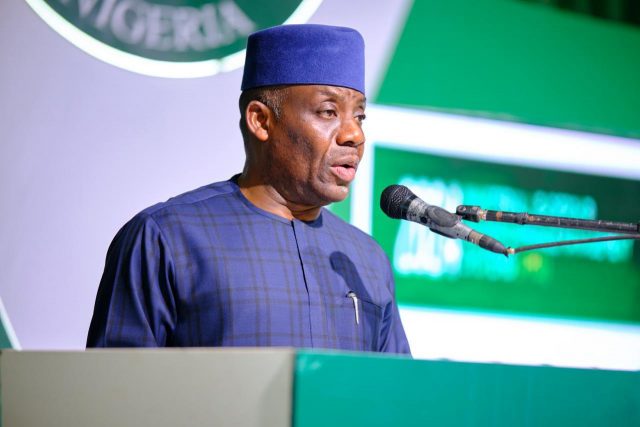According to Education Minister Tunji Alausa, 24 federal institutions have been powered by solar energy as part of the administration’s “Energizing Education Project” under President Bola Tinubu.
Eight additional universities have signed partnership agreements to join the fourth phase of the initiative, according to Alausa, who made this announcement on Wednesday in Abuja during the partnership Agreement Signing Ceremony with the vice chancellors of beneficiary institutions.
According to the News Agency of Nigeria, the minister toured the solar-powered facility at the University of Abuja, which is now Yakubu Gowon University, before to the signing ceremony.
Alausa praised Tinubu’s revolutionary idea, calling it a “new day for Nigeria,” which aims to give Nigeria’s federal tertiary institutions with a steady supply of electricity.
He said that the initiatives’ effects on the economy and education were extensive.
He claims that the University of Abuja, which currently has a solar farm with 6,000 photovoltaic panels, is producing about 3.3 megawatts of electricity per day, which is sufficient to run the university all day and all night.
“Our institutions will have constant, round-the-clock electricity thanks to this project.
“It enhances living and learning conditions for both students and faculty, permits more academic activity, and powers labs and libraries day and night,” he said.
The minister emphasized the initiative’s economic knock-on effects, describing how dependable electricity boosts campus business.
“On its own, any campus is a community. “You unleash high economic activity with a constant power supply,” he remarked.
The minister clarified that Tinubu’s Renewable Infrastructure Fund, which supports infrastructure development across industries, was supporting the project.
He, therefore, challenged vice chancellors of universities on innovative and creative ways of sustaining the project, noting that by 2027, every tertiary institution would have renewable energy generation.
On his part, the Managing Director, Rural Electrification Agency, Abba Aliyu, said that phases 1, 2, and 3 of the project have so far impacted over 600,000 students and 50,000 academic staff.
Aliyu said that the project had also generated over 100 megawatts of electricity to power university campuses and teaching hospitals.
He said the initiative, implemented through multiple phases, had already brought solar mini-grid infrastructure to 24 federal universities across the country.
“What you are seeing here is one of our interventions in the education sector, and the aim is to ensure that universities have a sustainable and affordable electricity supply,” he said
In addition to educational institutions, he said the Universal Public Health Project, part of phase 2, had successfully delivered clean energy to two universities and two teaching hospitals.
He added that Phase 3, which includes the electrification of eight more universities and one additional teaching hospital, is near completion and set to be commissioned in the coming two months.
The News Agency of Nigeria reports that the eight new beneficiary institutions include Ahmadu Bello University, Zaria; University of Nigeria, Nsukka; and Federal University, Wukari, Taraba State.
Others are Federal University Dutse, University of Benin, University of Ibadan, Obafemi Awolowo University, Ile-Ife and University of Lagos.





